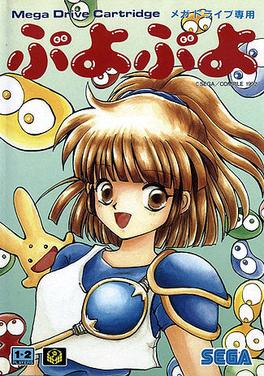
Puyo Puyo (ぷよぷよ) is a puzzle video game released in 1991 by Compile for the MSX2. Since its creation, it uses characters from Madō Monogatari. It was created by Masamitsu "Moo" Niitani, the founder of Compile, who was inspired by certain elements from the Tetris and Dr. Mario series of games.
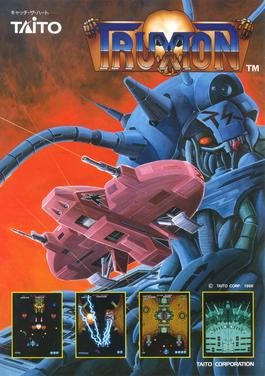
Truxton is a 1988 vertically scrolling shooter arcade video game originally developed by Toaplan and published in Japan and Europe by Taito, as well as in North America by Midway. Set in a future where the Gidans alien race led by Dogurava invaded the fictional planet Borogo, players assume the role of fighter pilot Tatsuo taking control of the Super Fighter ship on a last-ditch effort to overthrow the alien invaders.

is a platform game developed by Sega and released as an arcade video game in May 1984. It was licensed to Bally Midway for distribution in the United States. In Flicky, the player controls the eponymous blue bird and must gather all the small birds called Chirps in each round and bring them safely to the exit. There are cat and lizard enemies which can disperse the Chirps and kill the player, but Flicky can use items on the playing field to protect herself and the Chirps from danger.

Thunder Force III (サンダーフォースIII) is a 1990 scrolling shooter game developed by Technosoft for the Sega Genesis. It is the third chapter in the Thunder Force series. It was then retooled into an arcade game named Thunder Force AC. In 1991, Thunder Force AC was ported to the Super Nintendo Entertainment System under the title Thunder Spirits.
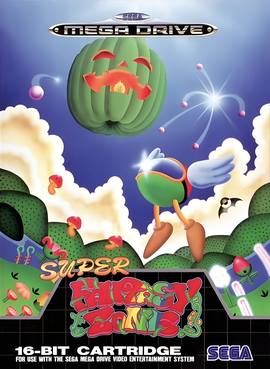
Super Fantasy Zone is a scrolling shooter video game developed and published by Sunsoft for the Mega Drive. Part of Sega's Fantasy Zone series, it was released only in Japan and Europe. Players control the character Opa-Opa on his quest to defeat Dark Menon, and the game plays similarly to previous Fantasy Zone entries. The game plays similarly to Defender, where the screen scrolls in the direction that Opa-Opa is going. The player shoots at enemies to defeat them, collecting gold coins that are used to purchase temporary upgrades that improve Opa-Opa's offensive capabilities and speed, among other things.

Rent A Hero is an action role-playing video game series released by Sega for the Mega Drive console in 1991 with a large emphasis on humor. The game features the same graphic engine previously used in the development of Sword of Vermilion. However, Rent A Hero has an unusual innovation for the genre. Instead of using standard turn-based battles, fights are in a similar format to 2D fighting games.

The TeraDrive is an IBM PC compatible system with an integrated Mega Drive, developed by Sega and manufactured by IBM in 1991. The TeraDrive allowed for Mega Drive games to be played the same time as the PC section is being used, as it is possible for the Mega Drive and PC hardware to interact with each other.

Quiz $ Millionaire, sometimes referred to as Who Wants to Be a Millionaire?, is a Japanese quiz show based on the original program of the latter title. It premiered on Fuji Television on April 20, 2000, and aired its final episode on January 2, 2013. The show was hosted by television personality Monta Mino throughout its entire run.

This is a list of development studios owned by Sega, a Japanese video game developer and publisher based in Tokyo, Japan. Accompanied with the list is their history of game development. Also included are the companies that Sega has acquired over the years. For a full list of games developed and published by Sega, see List of Sega video games, List of Sega mobile games and List of Sega arcade games.
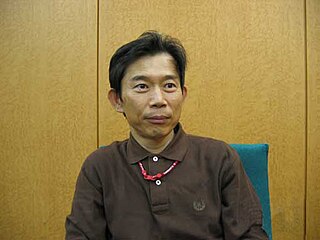
Hiroyuki Takahashi, is the president of the video game development studio Camelot Software Planning. He has participated in most of the company's projects as a game designer, producer, and writer.

Sega Hard Girls is a Japanese multimedia project produced as a collaboration between ASCII Media Works' Dengeki Bunko imprint and video game company Sega. The project re-imagines various Sega video game consoles as anthropomorphized goddesses who appear all over modern Japan. The project has inspired a light novel series written by Tōru Shiwasu with illustrations by Kei, which was serialized in ASCII Media Works' Dengeki Bunko Magazine between 2013 and 2014, and an anime television series adaptation titled Hi-sCoool! SeHa Girls by TMS Entertainment, which aired in Japan between October and December 2014. A crossover video game with Idea Factory's Hyperdimension Neptunia franchise, Superdimension Neptune VS Sega Hard Girls, was released for the PlayStation Vita in Japan in November 2015, and in North America and Europe in October 2016.
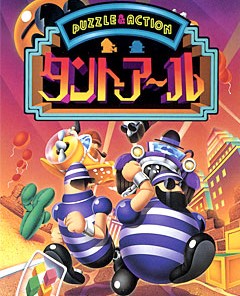
Puzzle & Action: Tant-R, is a puzzle video game developed and published by Sega in 1993 for the Sega System C in Japan. The first instalment in the Puzzle & Action trilogy, it is a spin-off of Bonanza Bros.. The characters from Bonanza Bros., Robo and Mobo, are featured as protagonists, functioning as detectives. A prison escapee is chased, and his henchmen interfere. A series of timed mini-games must be completed to defeat the henchmen. The game features references to western culture.

Puzzle & Action: Ichidant-R (also known as just Ichidant-R is a puzzle video game developed and released by Sega in 1994 for the Sega System C-2. It is the sequel to Puzzle & Action: Tant-R and is the second of the Puzzle & Action series. Gameplay is similar to Tant-R: the player must complete a series of mini-games, although its crime theme is replaced with a medieval theme. The detectives from the first game return and play the role of knights in a theatre play. An English version of the game exists, which replaces the Japanese voices with English voices. The Korean version also uses the English voices. The game was ported to the Game Gear in 1994, Mega Drive in 1995, and released on the Sega AgesRouka ni Ichidant-R compilation for the Sega Saturn. The game was released for the Wii Virtual Console in 2007. All console versions except for the Switch version are Japanese exclusives. The third and final game in the series, Puzzle & Action: Treasure Hunt, was released in 1995.
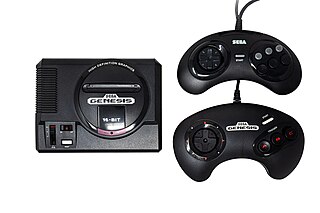
The Sega Genesis Mini, known as the Mega Drive Mini in regions outside of North America, is a dedicated console modeled on the Sega Genesis. The Mini emulates the original console's 16-bit hardware, and includes 42 games made available through emulation software by M2. It was released in North America and Japan in September 2019 and in Europe and the Middle East in October 2019. A follow-up, Sega Genesis Mini 2, was released in October 2022 and includes 60 games from the Genesis and Sega CD.

Ghostbusters is a 1990 platform shoot 'em up video game developed and published by Sega for the Sega Genesis/Mega Drive. It features an original story based on the Ghostbusters films, and is unrelated to a 1984 Ghostbusters game by Activision. The game was released in the United States in August 1990, and was released in the United Kingdom later that year. A Brazilian version by Tec Toy was released for the console in 1991.
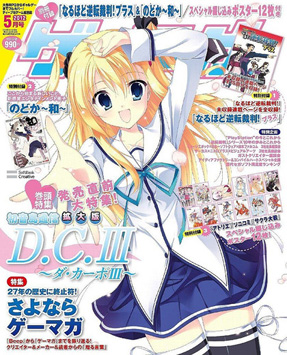
Gemaga was a Japanese video game magazine founded in 1984 as Beep and published by SB Creative. During its history, it was known variously as Beep, Beep! MegaDrive, Sega Saturn Magazine, Dreamcast Magazine, Dorimaga, and finally Gemaga. When it ended publication in May 2012, it was the longest-running Japanese game magazine.

















